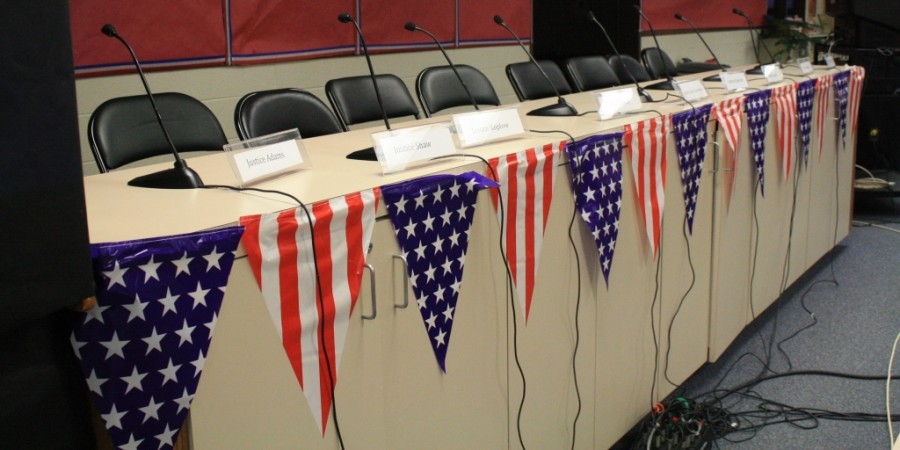8:00 am: Senior emcees Shy Daraiekia and Jacques Mariotti welcomed everyone to the event, then handed the microphone to senior coordinator Zack Dailey to present the introductory remarks. The Madrigals then took the stage to sing “God Bless America” and “The Star Spangled Banner.”
8:15 am: Seniors Marshall Nimick and Erik Pike debated the issue of whether the federal government should increase election regulations. Nimick argued that the federal government should, stating, “Inefficiency has run rampant throughout America’s voting process. This past 2012 presidential election had a great deal of inequality. 17.3 percent of black youth reported that their lack of ID prevented them from voting. Such numbers frankly disappoint me in our system.
Pike, on the other hand, argued that the country should work to fix the current flaws, in the current system. “Recent events have made it clear that the federal government is not the body to go to when we need efficiency. I believe in our ability to govern ourselves,” he said.
8:30 am: The Community Relations Committee, which was in charge of polling students and the community, presented its findings. The presentation got off to a rocky start with some technical difficulties, but the four speakers—Preet Sohal, Marly Messina, Sam Smith and Will Khairalla recovered quickly.
Messina noted that 72 percent of Caucasians polled felt that it isn’t a burden for people to provide proof of their citizenship before voting.
Smith added, “People who thought voter fraud is an issue in America tended to think that providing ID isn’t a burden.”
In addition to polling the community, the committee also held a voter registration drive at Langley. “We registered almost half the senior class to vote,” said Khairalla.
After the presentation, Sohal commented, “We practiced for two hours together over Skype last night. The technical difficulties threw me off today, but we brushed it off and continued with grace. It was a lot of fun presenting. “
8:45 am: Isabelle Ninh and Victoria Tovig, representing the History Honor Society, provided a look at the history of elections in America. The presentation involved quiz questions and candy.
“I think it well. I saw a lot of people eyeing that candy,” said Ninh afterwards.
9:00 am: Virginia House of Delegates representative Barbara Comstock took the podium. During her speech, she noted how in the early years of elections, people knew everybody in the town, which eliminated the risk of voter fraud. “Now, in the Langley precinct alone, there are over 2,000 voters,” she said.
During the question and answer that followed Comstock’s speech, senior Mujtaba Wani’s hand shot into the air. “Why did you vote against the recent transportation bill?” he asked.
The audience chuckled, and Comstock responded, “We wanted to have more money for transportation, but it’s not fair for you to be double taxed when you buy things. It was an equality issue. The bill taxed hybrids, and usually people buy those to save money on gas.”
9:30 am: Matt Smith, AJ Scalia and Drew Armstrong from the research committee presented background information on the case.
Armstrong stated, “Voter fraud is perceived as a myth in America, but it’s still prevalent today.” Scalia supported this claim, noting that “Mickey Mouse” had been registered to vote hundreds of times in elections.
Smith pointed out, “You need an ID to buy alcohol, go to the movies, cash a check, and fly, but you don’t need one to vote for the most important man in the world.”
10:00 am: The main event of Case Day—the oral arguments—drew an enormous audience, as students packed the library and stood in the back when all the seats were filled.
Seniors Nick Hallmark and Michael Osgood presented their arguments first. They represented the petitioner, the state of Arizona, arguing that the state should be able to require proof of citizenship when registering people to vote.
Hallmark argued that Arizona has the authority to regulate elections in this manner. “The qualifications clause of the constitution leaves the determination of voting qualifications to the states. We’re simply trying to ensure that those who are voting are actually citizens,” he said.
The justices interrupted the counsel every few seconds with questions. “The bench was very active, but the students kept up with the pace very well,” said government teacher Ms. Allison Cohen.
Seniors Cynthia Ding and Mujtaba Wani represented the Intertribal Council of Arizona, arguing that the requirement to provide proof of citizenship should not be upheld.
“I thought it went well, but I wish I had a chance to talk more about what I wanted to talk about, instead of [just] what the justices wanted to talk about,” said Wani afterwards.
Ding commented, ‘I was really nervous. The questions were tough and the judges were intimidating, but with all the preparing we did, we did as well as possible.”
The government teachers were extremely pleased with the performance of the counsel and justices (seniors Greg Adams and Clayton Kennedy sat on the bench along with seven other justices). “It went very well, I was very proud of them,” said government teacher Mr. Micah Herzig.
“They really held their own,” added Ms. Cohen.
To read about the afternoon session, click here.
Click here for the Saxon Scope’s live tweets of Case Day.


